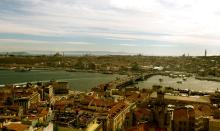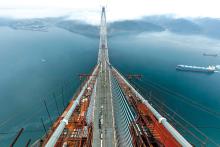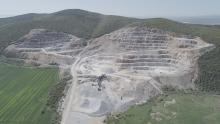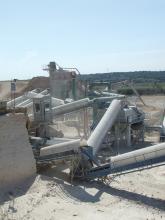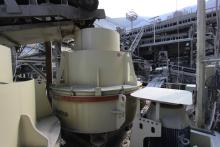Turkey’s aggregates demand has been consistent in recent years, with government-led targets around flagship infrastructure projects helping to maintain a healthy supply of building material products, while also generating a need among building contractors and quarry operators to update their construction and quarrying equipment fleets. Guy Woodford reports.
Turkey’s aggregate production has been consistently around 450 million tonnes/year over the last few years, making the nation the third biggest producer in Europe after Germany and Russia.
2017 is likely to be the same, with mega projects such as Istanbul’s third airport, the third Bosphorus Bridge Project, Canakkale Bridge, the North Marmara Highway Project, and a number of urban regeneration schemes creating strong need for raw building materials.
Furthermore, Turkish economic growth unexpectedly accelerated at the start of this year to its best pace in almost two years. GDP growth was up 5% in Q1 2017 in the first three months compared to the same period last year, and up from 3.5 per cent at the end of 2016.
More recently, in June 2017, the OECD (Organisation for Economic Co-operation & Development) tipped Turkey’s economic growth to rise by around 3.5% in 2017 and 2018. The highly respected organisation, which acts as a forum in which governments can work together to share experiences and seek solutions to common problems, noted that fiscal and other measures, supported by a pick-up in export demand, have stimulated Turkey’s private consumption and investment.
Güray Kir, general manager, sales & service for Metso Turkey, says ongoing major infrastructure works in Istanbul, a city with a population of 14.8 million, represent a sizeable part of Turkey’s overall aggregates demand.
“About 20% of aggregate consumption centres on the Istanbul area, and Istanbul area consumption will grow 10% a year on average in the next five years, and will continue to grow around 5% a year after that, according to AGÜB (Turkey Aggregates Producers Association).
“Metso Turkey’s estimation for Turkey’s aggregate production growth is around 5-6% for the next five years. The main drivers will be the mega projects such as Istanbul’s third airport, which is under construction.”
Kir notes that the third bridge on the Bosphorus and the third Istanbul Airport project will result in new living quarters in what is one of the world’s megacities. “We will see construction of completely new hotels, businesses and shopping centres, and many more facilities in this area.”
From a Turkey-wide perspective, Kir also points to opportunities for Metso and other leading large and smaller global quarrying and construction OEMs, along with Turkey’s 750-odd aggregate producers, from urban transformation projects due to earthquake risk in many parts of the country. Add to this a commitment from the Turkish government to improve the national road network; and the necessity for new buildings, schools and hospitals, due to an above average population rise, partly due to the arrival of over 3 million immigrants from neighbouring countries, and you can see why the Turkish aggregates sector can remain relatively buoyant in the coming years.
The encouraging picture for Turkish aggregates demand and the wider national economy is even more impressive when you consider the continuing instability of the country’s politics. In early 2017, Turkey’s ruling AK Party won a bitterly-contested constitutional referendum approving sweeping changes to the Turkish constitution which will hand unprecedented powers to its president, Recep Tayyip Erdogan. Europe and the wider world is somewhat anxiously waiting to see how president Erdogan uses his greater powers in the nation’s governance.
For the likes of Metso and other leading global quarrying OEMs, the key to prolonged commercial success is installing the right plant solutions for the customers’ needs. So, what type of crushing and screening models are most popular among Turkish quarry operators and contractors?
“About 75% of aggregate reserve in Turkey is limestone. That means that the majority of production is from soft rock. Thus horizantal shaft impactors are the most popular crushers in Turkey,” explains Kir.
“In hard, abrasive rock, cone crushers in secondary and VSI in tertiary [production stages] are popular. The Turkish market prefers VSI in tertiary because of low initial investment cost and the familiarity of quarry owners with VSI product shape quality. In the secondary application, the Metso HP300 cone crusher has been the best seller in the Turkish aggregate market for long time.
“On the other hand, increasing competition pushes quarries to lower operational costs. When the focus is on OPEX rather than CAPEX, there can be a tendency to use cone crushers in tertiary materials processing.”
In recent years, Turkish quarry operators and contractors have, explains Kir, needed to adhere to stricter regulations and controls for environmental protection in quarries. “Stricter controls and the heavy process during licensing of new quarry investments impact negatively on new investments and capacity increase plans of existing quarries,” he concludes.
AGÜB’s 50 member companies are responsible for 25% of the average 450 million tonnes/year of aggregates produced in Turkey each year.
Çalar Tanin, AGÜB’ secretary general, stresses that the encouraging growth in the Turkish aggregates sector, forecasted by themselves and other leading industry analysts, is dependent on new major infrastructure projects.
One cited by Tanin as being crucial to Turkey’s aggregates demand growth is Kanal Istanbul (Istanbul Canal). The project will see the creation of an artificial sea-level waterway on the European side of Turkey, connecting the Black Sea to the Sea of Marmara, and hence to the Aegean and Mediterranean Seas.
The project’s main goal is to reduce the marine traffic through the Bosphorus and minimise the risks and dangers associated particularly with tankers. Around 56,000 vessels are said to pass yearly through the Istanbul Strait, among them 10,000 tankers carrying more than 130 million tonnes of crude oil.
“A large part of these huge infrastructure investments depend on Turkish government policy, with big projects done via a Build-Operate-Transfer model,” explains Tanin.
Tanin and his colleagues at AGÜB say they and their members’ efforts to stimulate domestic aggregates production are currently being hindered by strict laws around quarrying near Turkey’s huge number of olive cultivation yards. Turkey is among the world’s biggest olive oil producers. Around 1 million tonnes of olives are processed in the country each year, generating 170,000tonnes of olive oil per annum. As such, the olive oil industry generates huge money revenues, while also being a major national employer. All these factors make any change in how the olive oil industry operates subject to huge public and political scrutiny.
“It is currently not possible for a quarry company to work within 3km of an olive yard,” explains Tanin. “We will be doing scientific research with Olive Research Institute of Turkey as there is not currently any research data around the impact of these laws. After this research, we hope a new [reduced] distance for quarrying in proximity to olive yards will be introduced.”
With Recep Tayyip Erdogan, Turkey’s president, determined to see his flagship infrastructure targets achieved, it seems that finding answers to all issues hindering aggregates production is very much a national priority.

